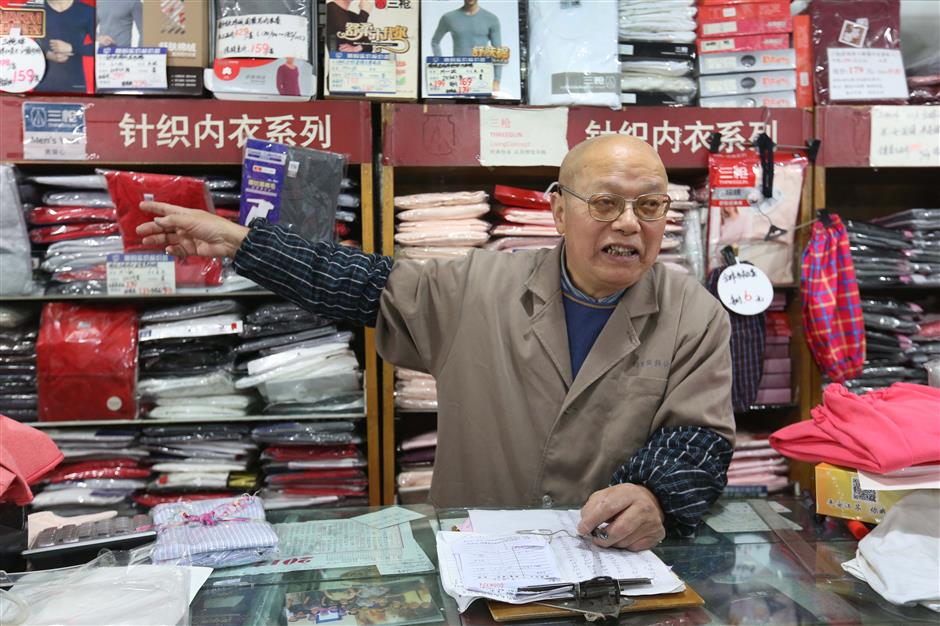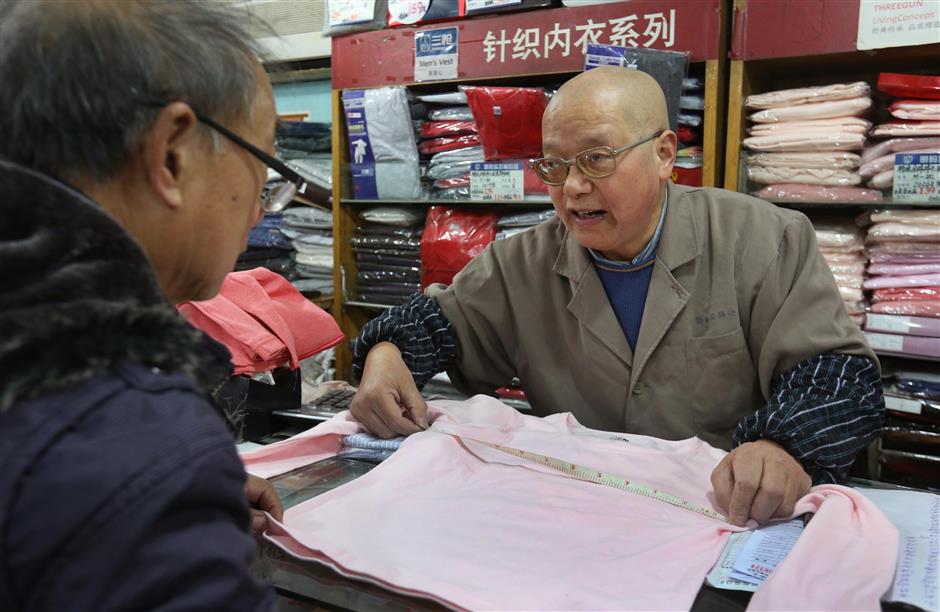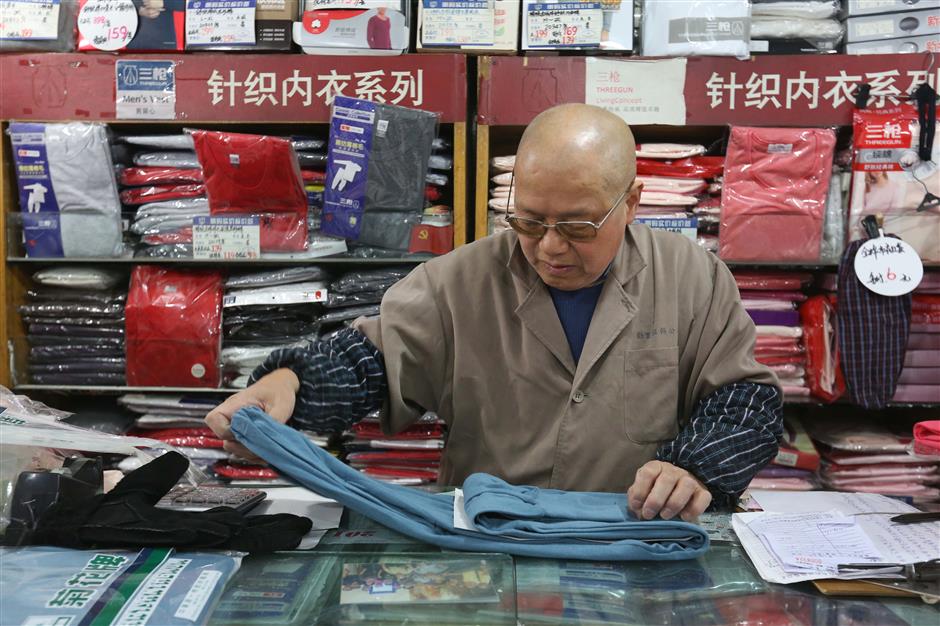Old underwear shop evokes memories of Shanghai's past

Zhu Shaozhuang, 67, introduces underwear to his customers at his shop.
For about three decades, 67-year-old Zhu Shaozhuang has been running a shop that sells traditional underwear on Yuyuan Road, Changning District. For his customers, it evokes memories of old Shanghai.
The shop, which occupies 30 square meters, is very popular among the elderly because of its highly affordable prices and wide range of goods that come in different styles and sizes. Zhu has also been drawing customers with his kindness, consideration, and patience.
The shop offers mianmaoshan and mianmaoku (respectively shirts and trousers made with cotton and wool), staple clothing of the Shanghainese, especially those who are middle-aged or elderly, during the cold days of autumn and winter.
Mianmaoshan and mianmaoku, called qiuyi and qiuku (autumn shirts and trousers) in northern China, are now nicknamed "Me More Say" and "Me More Cool" by young Chinese in an effort to make them easier for foreigners to pronounce.
In Zhu's shop, customers can find various types of long-sleeved inner shirts and thermal trousers in modern and traditional styles, as well as shorts and panties worn by grandparents. Some large-sized items which may not be available in supermarkets can often be found in Zhu's shop.
At 2pm yesterday afternoon, some customers were waiting outside the store before it reopened after a lunch break. More people entered the shop after two minutes, making it crowded.
Clothes were piled high on the shop's shelves and counters, and its wall displays samples. On each kind of garment, Zhu posted handwritten notes that tell of the brand, the size range, materials and price.
The clothes that could not be placed on the shelves were neatly stacked on the floor and in the stock room, tied together in the same way.
Zhu has a pair of what the Chinese call "Huo Yan Jin Jing," or "fiery golden eyes." When a customer visits his shop for the first time, he can accurately tell what size of clothes fit them.
As the shop's sole worker, Zhu fetches the tied-up bundled clothes, untying the knots and picking what he needs — all in just a few minutes. "I have been doing that for more than 20 years," Zhu said.
At the shop yesterday was a man in his 70s. Surnamed Shen, he said: "I have been wearing a type of old-fashioned underwear shorts since young. Nowadays it's hard to find them because more and more people prefer briefs.
"Sometimes some market traders sold it but the products were often of very poor quality."
After Shen learned that traditional underwear was available at Zhu's shop, he visited the shop and found what he was looking for. He initially brought five pairs of underwear shorts. Two hours later, Shen returned to buy three more pairs. He paid just 12 yuan (US$1.80) per pair.
A frequent visitor to Zhu's shop is 70-year-old Grandma Chen, a neighboring resident. "The prices are cheap here and the shopkeeper is a very nice guy," she said.
The prices of goods in Zhu's shop are usually 20 yuan less than their market prices. Some goods in Zhu's shop are discounted by as much as 40 to 50 percent.
"You know, in supermarkets, there is no one that we can turn to for advice. But here, he (Zhu) knows everything about the products," said another customer, adding that Zhu could respond in just a second when a customer asked about a shirt's percentage makeup of different materials.
Many of Zhu's customers also bought underwear from his shop for their family and friends.
The shop also provides old-school items such as xiutao, protective covers for sleeves, and children's pajamas that the elderly may buy for their grandchildren.

Zhu's goods, regardless of their price, can all be exchanged if they have not been washed. Yesterday afternoon, some customers asked to exchange their purchases because of wrong sizes or dissatisfaction with the materials. Zhu allowed them to exchange their purchases without hesitation.
The shop is akin to a small community. With the start of the busy winter season, Zhu said about 100 people had been visiting his shop every day. He enjoys talking with them, and hopes he can keep the shop going until he is 70 or older.
For Zhu, the shop is an important part of his life. "Two years ago I was diagnosed with early prostate cancer and had a rest for two to three months," Zhu said. "But after I recovered, I immediately returned to my shop because I missed my customers, who are also my friends."
He said he was also heartened by his customers' well wishes and concerns about his illness.
Sometimes the shop would draw foreign customers. "Sometimes there is a person in the shop who can speak English and translate for me, or I would write down the price and show them," Zhu said.
But as Yuyuan Road gentrifies, more modern and attractive shops open, causing some of Zhu's customers to worry that he would be asked to close his shop for good.
"If it's required, then I will close my shop. But if my shop can exist, I will continue my business," said Zhu, who is also thinking of using the Alipay and WeChat payment systems in his shop to cater to young customers.
















